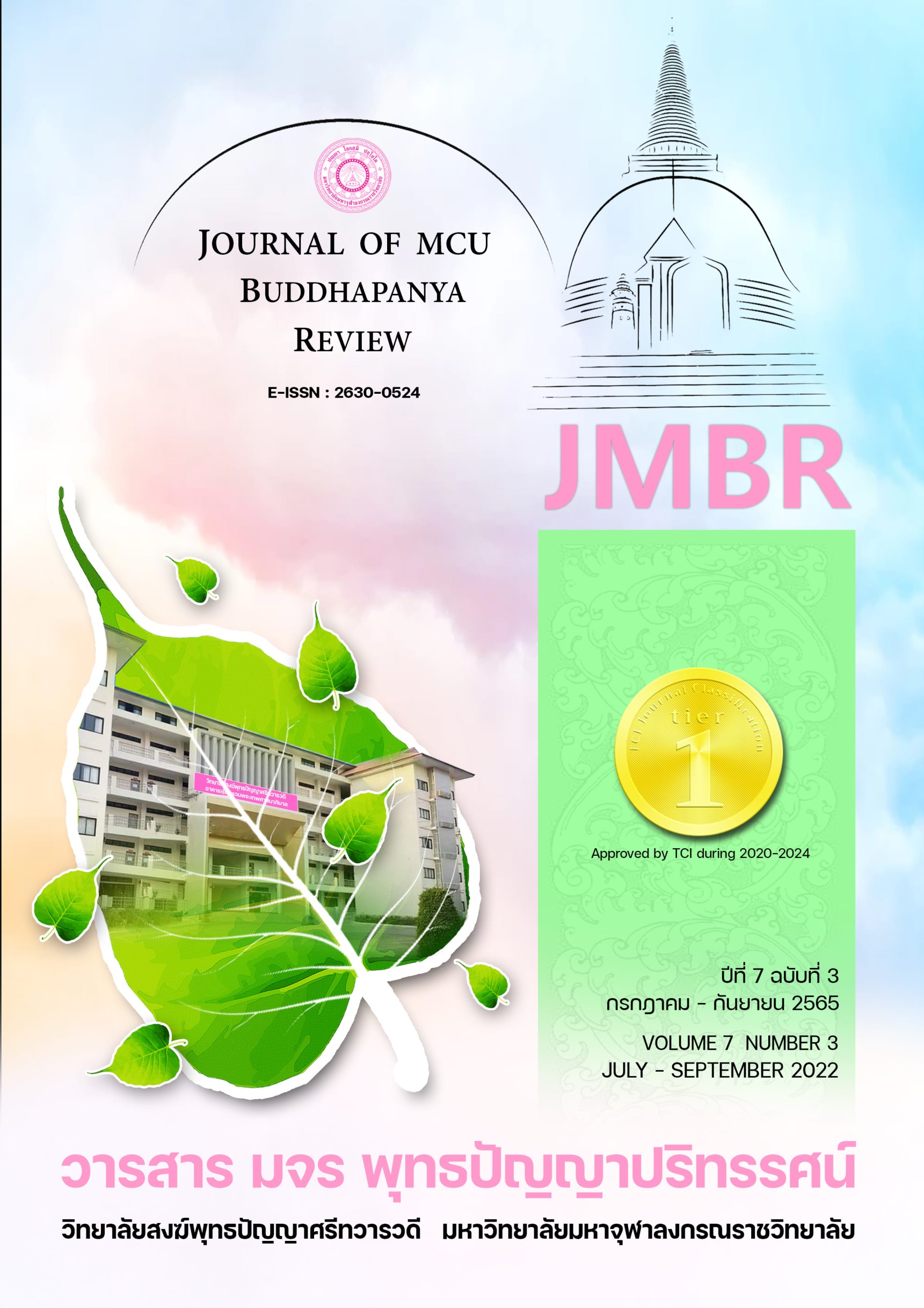EXPLORING ACCULTURATION STRATEGIES OF AN INDIAN MIGRANT LIVING IN THAILAND
คำสำคัญ:
Acculturation Strategies, Indian Migrant, Intercultural Encounterบทคัดย่อ
Since the world becomes more multicultural, cultural conflict or cultural clash is highly concerned by researchers who actively identify the factors or causes of the conflict as well as suggesting potential and fruitful ways of coping with it. To extend this line of research, this study, therefore, aims at investigating acculturation strategies used by a migrant living in multicultural context and her ways of dealing with challenges or difficulties during her adaptation process. This study employs a qualitative approach using in-depth interview. An Indian migrant living in Thailand for thirty years was purposively selected as a case study. The interview was conducted via Zoom application since the COVID-19 is still in serious condition. The Berry’s (1997) acculturation strategies including separation, integration, assimilation, and marginalization were employed as an analytical framework. The results reveal that separation and integration strategies were predominant but in different situations and periods of time. Contacting original or home culture when experiencing cultural conflict can reduce stress and confusion. However, being open-minded to new things and balanced between two cultures seem to be effective ways of stay in multicultural community.
เอกสารอ้างอิง
Berry, J. (1997). Immigration, acculturation and adaptation. Applied Psychology: An International Review, 46, 5-34.
Berry, J., Phinney, J., Sam, D. & Vedder, P. (2006). Immigrant youth: acculturation, identity, and adaptation. Applied Psychology: An International Review, 55, 303-332.
Berry, J., Kim, U., Minde, T. & Mok, D. (1987). Comparative studies of acculturative stress. International Migration Review, 21, 491-511.
Berry, J. W., Kim, U., Power, S., Young, M., & Bujaki, M. (1989). Acculturation attitudes in plural societies. Applied psychology, 38(2), 185-206.
Bourhis, R. Y., Moïse, L. C., Perreault, S., & Senécal, S. (1997). Towards an interactive acculturation model: A social psychological approach. International Journal of Psychology, 32(6), 369–386. https://doi.org/10.1080/002075997400629
Camacho, M., Minelli, J., & Grosseck, G. (2012). Self and Identity: Raising Undergraduate Students’ Awareness on Their Digital Footprints. Procedia - Social and Behavioral Sciences, 46, 3176-3181.
De Fina, A., (2011). Discourse studies: A multidisciplinary introduction, V. A. Teun, (Ed.). London: Sage, pp. 265-266.
De Juan-Vigaray, M. D., Sarabia-Sánchez, F. J., & Garau-Vadell, J. B. (2013). The acculturation of international residential tourists and their shopping behaviours. Tourism management, 36, 115-118. https://doi.org/10.1016/j.tourman.2012.11.017
Delahunty, J. (2012). ‘Who am I?’: Exploring identity in online discussion forums. International Journal of Educational Research, 53, 407-420.
Furham, A. (2012). Culture Shock. Journal of Psychology and Education, 7(1), 9-22
Hofstede, G. (2001), Culture’s Consequences: Comparing Values, Behaviors, Institutions, and Organizations Across Nations, 2nd ed. Sage, Thousand Oaks, CA.
Huffaker, D. A., & Calvert, S. L. (2005). Gender, Identity, and Language Use in Teenage Blogs. Journal of Computer-Mediated Communication, 10(2), JCMC10211.
Johnstone, B., 2008. Discourse analysis. USA: Blackwell.
De Juan-Vigaray, M. D., Sarabia-Sánchez, F. J., & Garau-Vadell, J. B. (2013). The acculturation of international residential tourists and their shopping behaviours. Tourism management, 36, 115-118.
Kim, H.W., Zheng, J. R., & Gupta, S. (2011). Examining knowledge contribution from the perspective of an online identity in blogging communities. Computers in Human Behavior, 27(5), 1760-1770.
Kwak, K. (2003). Adolescents and their parents: A review of intergenerational family relations for immigrant and non-immigrant families. Human development, 46(2-3), 115-136.
Lee, W., & Tse, D.K. (1994). Becoming Canadian: understanding how Hong Kong immigrants change their consumption. Pacific Affairs, 67(1), 70-95.
Nesdale, D., Rooney, R. & Smith, L. (1997). Migrant ethnic identity and psychological distress. Journal of Cross-Cultural Psychology, 28, 569-588.
Ryder, A. G., Alden, L. E., & Paulhus, D. L. (2000). Is acculturation unidimensional or bidimensional? A head-to-head comparison in the prediction of personality, self- identity, and adjustment. Journal of personality and social psychology, 79(1), 49-65.
Rosenthal, D. A. (1984). Intergenerational conflict and culture: A study of immigrant and nonimmigrant adolescents and their parents. Genetic Psychology Monographs, 109(1), 53–75.
Statman, M. (2018). Culture Matters to Clients, and It Should Matter to Planners. Journal of Financial Planning, 31, 32-34.
Tylor, E. B. (1871). Primitive culture: Researches into the development of mythology, philosophy, religion, art and custom (Vol. 2). J. Murray.
Ward, C., Bochner, S., & Furnham, A. (2020). The psychology of culture shock. Routledge.
ดาวน์โหลด
เผยแพร่แล้ว
รูปแบบการอ้างอิง
ฉบับ
ประเภทบทความ
สัญญาอนุญาต
ลิขสิทธิ์ (c) 2022 วารสาร มจร พุทธปัญญาปริทรรศน์

อนุญาตภายใต้เงื่อนไข Creative Commons Attribution-NonCommercial-NoDerivatives 4.0 International License.



